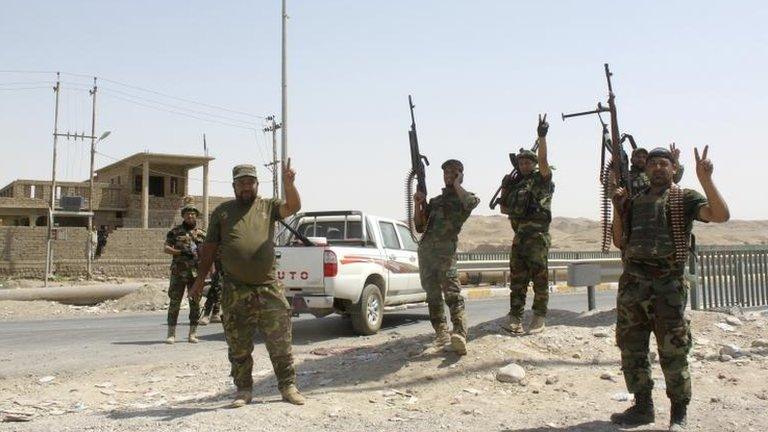David Cameron outlines new anti-terror measures to MPs
- Published
David Cameron: "Passports are not an automatic right"
New powers are needed to seize terrorist suspects' passports and stop British-born extremists from returning to the UK, David Cameron has said.
It was "abhorrent" British citizens had "declared their allegiance" to groups like Islamic State, he told MPs.
He said the inability to stop UK terrorists returning home from overseas was "a gap in the armoury" but only pledged cross-party talks on the issue.
Powers to monitor suspects in the UK will also be strengthened.
In a statement to Parliament, Mr Cameron restated the UK's backing for US airstrikes against Islamic State militants in Iraq and said he would not rule out participation in similar action in the future.
The UK's terror threat level was raised to "severe" from "substantial" on Friday.
'Forensic focus'
The prime minister told MPs that developments in the Middle East over recent months had major implications for the UK's security, with 500 British nationals estimated to have travelled to Iraq and Syria to fight on behalf of Islamic State and other militant groups.
He said the whole world had been "sickened and shocked" by the killing of US journalist James Foley and other atrocities in Iraq.
While rejecting calls for "sweeping and blanket" new laws in response, he said a "forensic focus" was needed to prevent people from travelling abroad in the first place and to deal with British jihadists returning to the UK from conflict zones.
Among measures announced:
Legislation will be drawn up to give the police statutory powers to confiscate the passports of suspect terrorists at UK borders
The UK will challenge any attempt by the courts to water down these powers
Plans to block suspected British terrorists from returning to the UK will be drawn up on a "cross-party basis"
Terrorism prevention and investigation measures (Tpims) will be extended, to include the power to relocate suspects
Terrorists will be required to undergo de-radicalisation programmes
Airlines will be forced to hand over more information about passengers travelling to and from conflict zones
The home secretary already has executive powers to seize the passports of those travelling abroad in certain cases but Mr Cameron said the police needed greater discretion to act where needed.
"We will introduce specific and targeted legislation... providing the police with a temporary power to seize a passport at the border during which time they will be able to investigate the individual concerned," he said.
Mr Cameron said the UK was able to block foreign nationals and those with dual citizenship from re-entering the UK but did not have the same power for UK nationals deemed to pose a threat to the country.
Under his proposals, UK nationals suspected of being involved in terror acts would be allowed to keep their British citizenship, but they would be prevented from re-entering the UK for a period of time.
He added: "Adhering to British values is not an option or a choice. It is a duty for all those who live in these islands so we will stand up for our values, we will in the end defeat this extremism and we will secure our way of life for generations to come."
Ed Miliband: "It was a mistake to get rid of control orders"
Labour leader Ed Miliband said the opposition would offer broad support to the government in its core objectives of keeping the UK safe but said there was a lack of detail and Mr Cameron had been wrong to abolish the system of control orders - which banned suspects from certain areas - in 2011.
"Relocation was indeed a central part of control orders and it was a mistake to get rid of them in the first place," he said.
Mr Miliband said a "mandatory and comprehensive programme of de-radicalisation" was needed "not just for those who will be under Tpims but those who have been on the fringes of extremism in Iraq and Syria".
Deputy Prime Minister and Liberal Democrat leader Nick Clegg told the BBC the coalition was "absolutely not repeating the mistakes of the last Labour government, which introduced very faulty control orders that kept being challenged by the courts".
It was instead a way to "disrupt the contacts" extremists had "with other people who we think are of real concern".
Amid talk of Lib Dem opposition to some of the proposals, former leader Sir Menzies Campbell said the package was "more nuanced" than anticipated but warned that rendering citizens stateless was regarded as illegal in international law.
While many Tory MPs backed the measures, former Attorney General Dominic Grieve warned plans to bar UK nationals from returning home risked "flouting principles of international law and of English common law" and called for prosecutions in the UK where possible.
It is already a criminal offence to travel abroad to commit or prepare a terrorist offence or to travel for the purpose of terrorist training, with suspects able to be prosecuted in the UK.

Clive Coleman, BBC Legal Affairs Correspondent
There is a real and important difference between removing a person's citizenship and removing their passport.
If a British citizen who holds sole British nationality - ie does not have dual citizenship - has his or her British citizenship removed, that would render the person stateless, and that is contrary to both international and domestic law. Under current law, the home secretary is prevented from removing citizenship if to do so would render a citizen stateless.
So, in practice, the power can only be used against those with dual citizenship. The government wants to change the law. This could mean that citizenship can be removed from those with sole British nationality. However, we will have to wait and see precisely what the government announces in its package of measures today.
If a person with sole British nationality is or has been acting in a way that is "not conducive to the public good", for instance by involving themselves in terrorism, then they can have their passport removed. That can be a temporary measure and does not remove their citizenship.

BBC political editor Nick Robinson said the UK was looking at working with Germany, Turkey and other countries through which suspected British jihadists travelled to and from the Middle East to alert them to their presence so they could be detained and questioned before setting foot on UK soil.
June Kelly asks if the government's new terror measures can stop British fighters leaving the country
IS militants have seized swathes of territory in Syria and Iraq and have been condemned for the mass slaughter of religious minorities in the region, including Iraqi Christians and the Yazidi community.
The UK is assisting Iraqi and Kurdish forces fighting Islamic State as well as providing humanitarian aid to those displaced by the fighting.
On Sunday, the RAF delivered 11 tonnes of equipment directly to the northern city of Irbil, including ammunition supplied by other nations and body armour helmets provided by the UK.
A poll by ComRes for the Independent newspaper suggests 35% of people in the UK think the government should launch airstrikes against Islamic State, while 50% think it should not.
Pollsters questioned 1,000 adults by telephone between 29 and 31 August.
- Published1 September 2014
- Published31 August 2014

- Published31 August 2014

- Published30 August 2014
